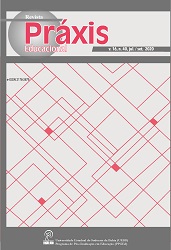THE EDUCATIONAL DYNAMICS IN MOZAMBIQUE: OBJECTIVES AND PERSPECTIVES
DOI:
https://doi.org/10.22481/praxisedu.v16i40.5078Keywords:
Educational dynamic, Sustainable development, Qualitiy of educationAbstract
This article deals with The Educational Dynamics in Mozambique: Objectives and Perspectives. The method of bibliographic research was used in order to add a greater content and rigor to this knowledge. Although education in Mozambique has gone through several phases throughout its history, it still faces several challenges that need to be overcome. The education sector must achieve economic independence, which will give it autonomy in order to carry out its activities and provide a quality education for Mozambicans, since only an adequate education can form quality men for a nation. It is necessary for the Mozambican Government to conceive an education in the line of creativity that leads to the creation of the work, focusing on the dialectical knowledge and the reflection of man on himself and on society, since this "creative" education is innovative because it is essentially anthropological and presupposes a climate of maximum freedom, which in the language of Habermas is an emancipatory education. And not of reproducibility, because this is an education of necessity, that is, a movement of repetition, even when its repetition approaches the original work.
Downloads
Metrics
References
BERTEN, André. (2004). Filosofia Social – A responsabilidade social do filósofo. São Paulo: Paulus.
CASTIANO, José P. & NGOENHA, Severino Elias. (2013). A Longa Marcha duma Educação Para Todos em Moçambique. Maputo: Publifix Lda.
DU BOIS, W. E. B. (1999). As Almas da Gente Negra, Trad. Heloisa Toller Gomes. Editora, Rio de Janeiro: Lacerda.
FREIRE, Paulo. (1987). Pedagogia do Oprimido. Rio de Janeiro: Paz e Terra.
GOLIAS, Manuel. (1992). Sistemas de Ensino em Moçambique: Passado e Presente. Maputo: Escolar.
HEGEL, George Wilhelm Friedrich. (2001). A Razão na História: uma introdução geral à filosofia da história. Trad. Beatriz Sidou. São Paulo: Centauro.
INDE/MINED. (2003). Plano Curricular do Ensino Básico. Moçambique: DINAME.
JOHNSTON, Anton. (1986). Educação em Moçambique 1975-1984. Stockholm: SIDA, Education Division Documents nº. 30.
KANT, Immanuel. (1995). A Paz Perpétua e Outros Opúsculos. Trad. Artur Morão. Lisboa: Edições 70.
MARQUES, Ramiro. (2002). Valores Éticos e Cidadania na Escola. Lisboa: Presença.
MAZULA, Brazão. (1995). Educação, Cultura e Ideologia em Moçambique: 1975-1985. São Paulo: USP.
MUDIMBE, V. Y. (2013). A Invenção de Africa – Gnose, Filosofia e Ordem do Conhecimento. Portugal: Edições Pedago Lda.
NGOENHA, Severino Elias. (1992). Por Uma Dimensão Moçambicana da Consciência Histórica. Porto Edições Salesianas.
________________________. (1994). Filosofia Africana: Das Independências às Liberdades. Maputo: Edições Paulistas – África.
RAWLS, John. (2000). Justiça e Democracia. Trad. Irene A. Paternot. São Paulo: Martins Fontes.
SAÚTE, Alda Romão. (2004). Escola de Habilitação de Professores Indígenas «José Cabral», Manhiça-Alvor (1926-1974). Maputo: Promédia, Colecção Identidades.
SEN, Amartya. (1998). O Desenvolvimento como Liberdade. Trad. Joaquim Coelho Rosa. Brasil: Gradiva.
Legislação
BOLETIM OFICIAL nº. 13, de 27 de Março de 1935, que aprova o Regulamento do Ensino Primário Rudimentar e o Regulamento das Escolas Distritais de Artes e Ofícios.
————————- nº. 33, que aprova o Regulamento da Caixa da Escola de Artes e Ofícios para a Escola António Enes de Moamba.
————————- nº. 6, de 10 de Fevereiro de 1937, que aprova a Remodelação da Escola de Habilitação de Professores Indígenas.
————————- nº. 11, de 17 de Setembro de 1937, que aprova os Estatutos da Caixa Escolar da Escola de Habilitação de Professores Indígenas José Cabral.
————————- nº. 13 (Série I), de 31 de Março de 1962.
————————- nº. 6 (Série I, Suplemento 2), de 13 de Fevereiro de 1969.
Decreto-Lei nº. 35.507, de 17 de Setembro de 1947.
Decreto nº. 45.908, de 1964.
Portaria nº. 8.395, de 31 de Maio de 1950.
————- nº. 4.469, de 13 de Agosto de 1941.
———— nº. 15.971, publicado no Boletim Oficial nº. 13, de 31 de Março de 1962.
Downloads
Published
How to Cite
Issue
Section
License
You are free to:
Share - copy and redistribute the material in any medium or format; Adapt - remix, transform, and build from the material for any purpose, even commercially. This license is acceptable for Free Cultural Works. The licensor cannot revoke these freedoms as long as you follow the terms of the license.
Under the following terms:
Attribution - You must appropriately give credit, provide a link to the license, and indicate if any changes have been made. You may do so in any reasonable way, but not in a way that suggests that you or your use is endorsed by the licensor.
There are no additional restrictions - You cannot apply legal terms or technological measures that legally restrict others to make any use permitted by the license.










